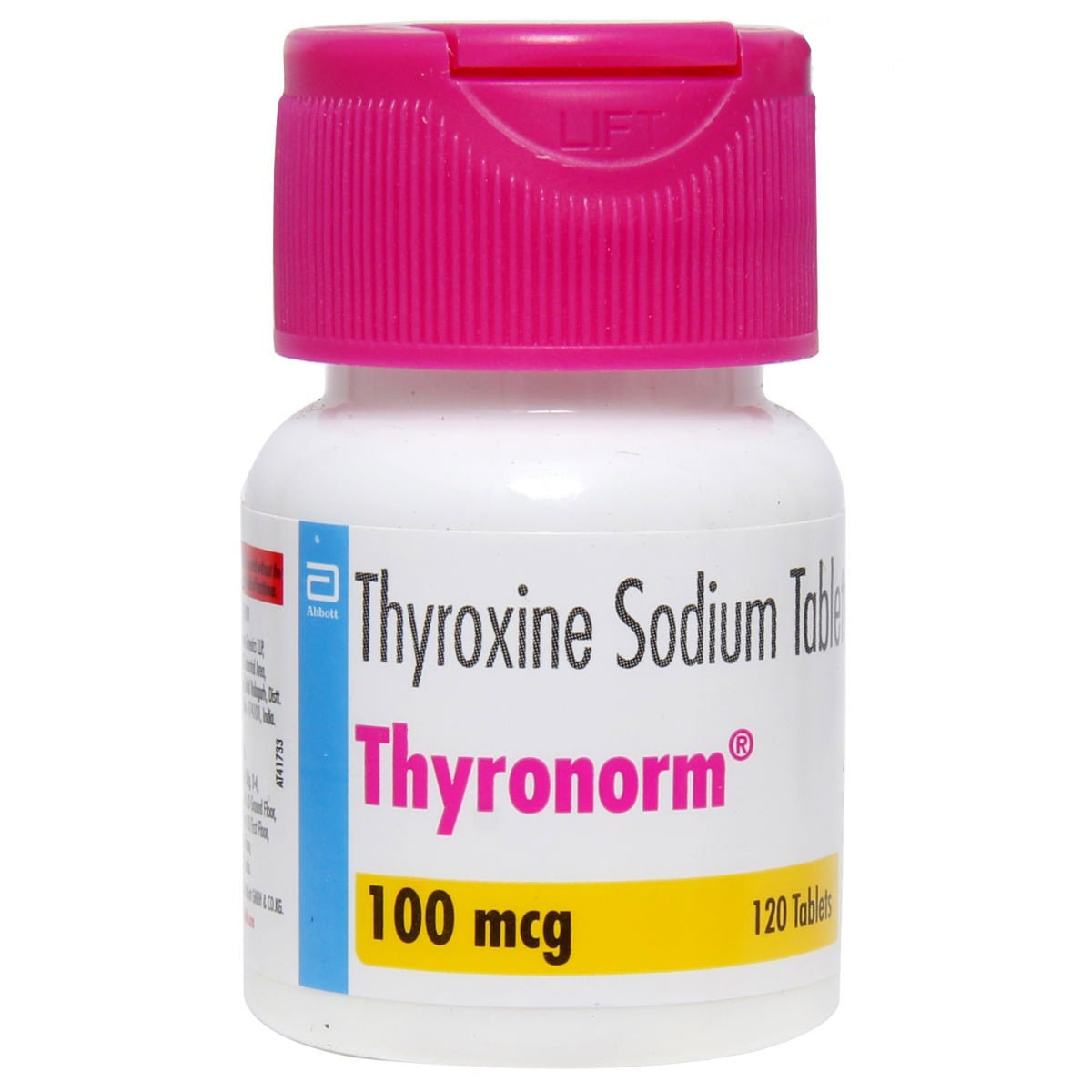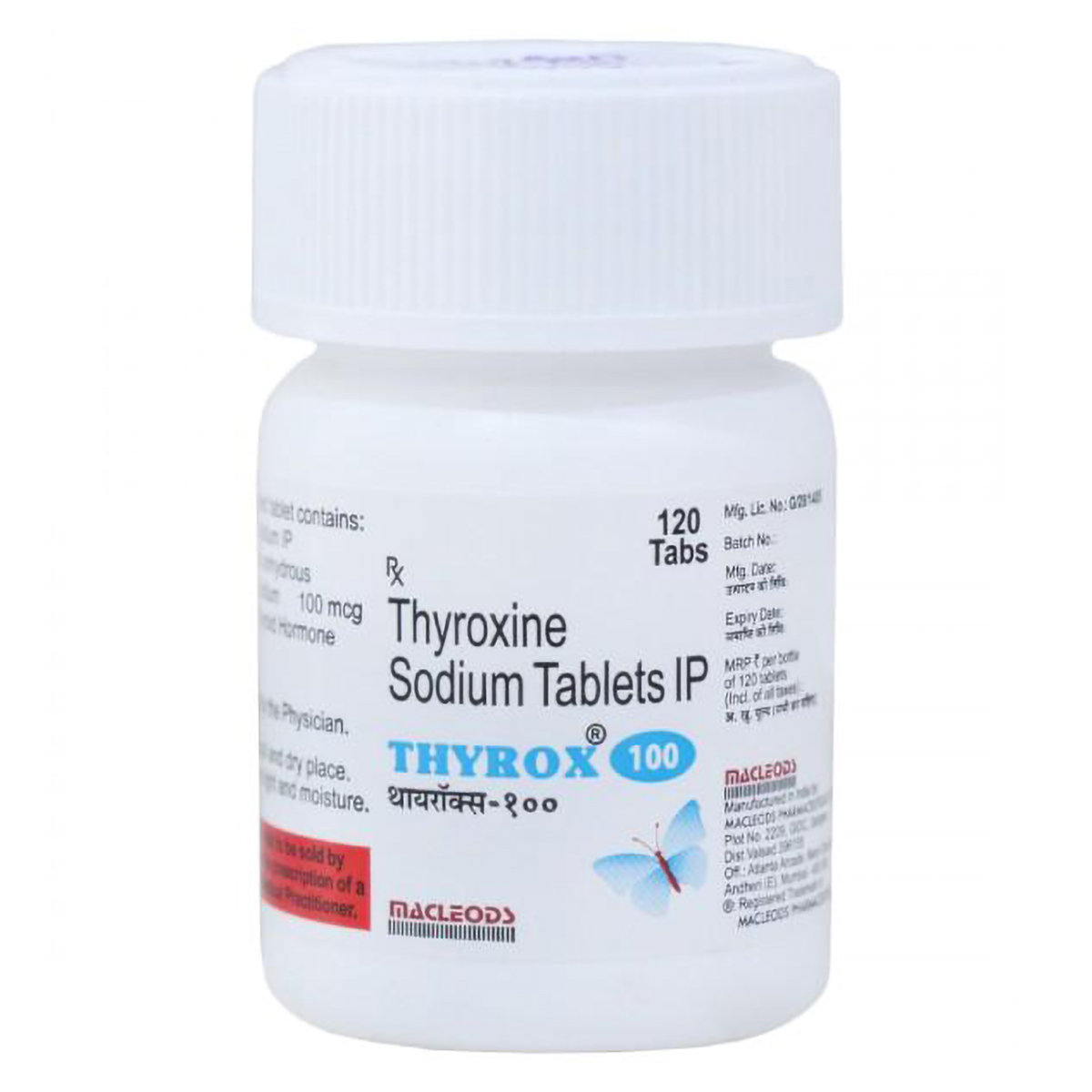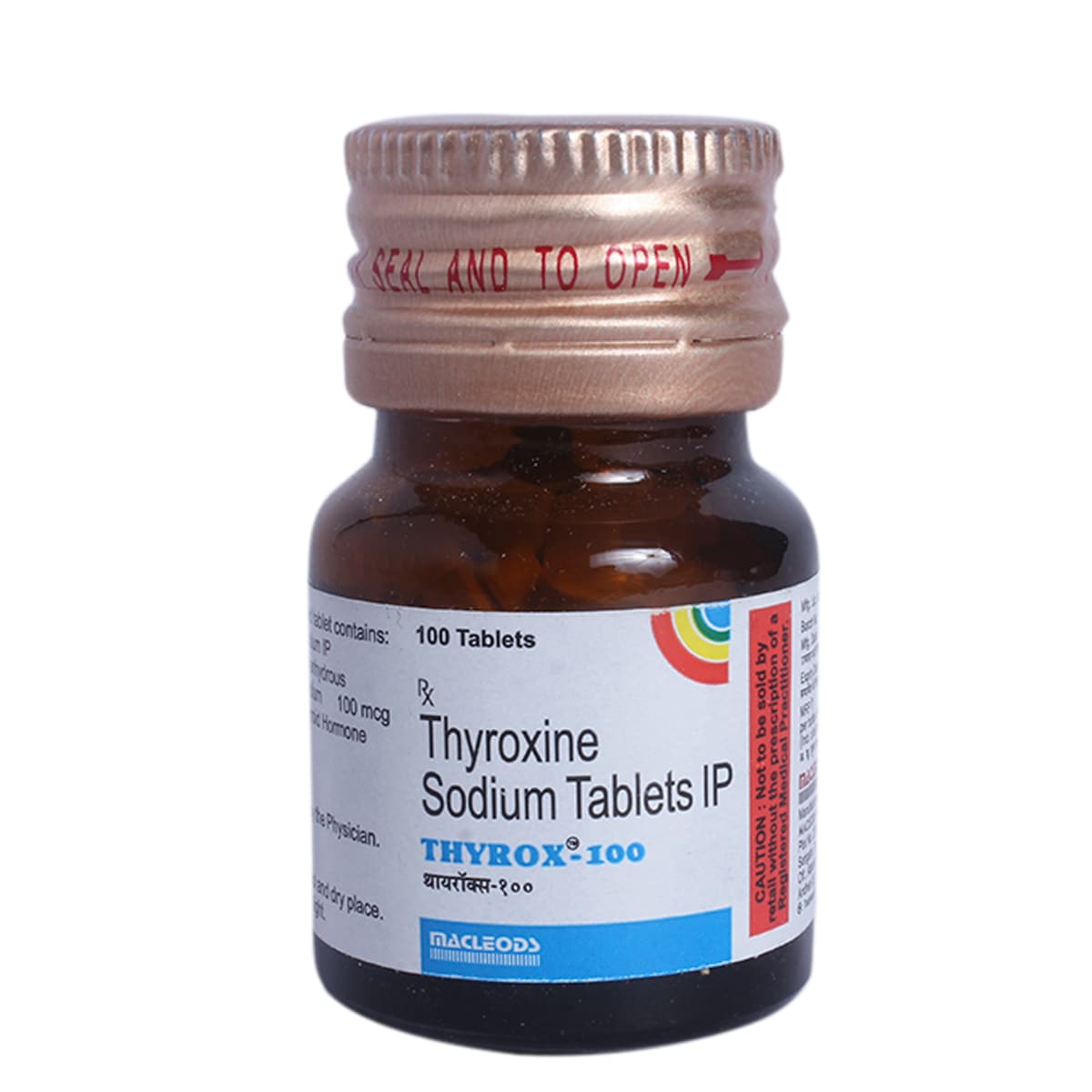Thyrose 100 MCG Tablet 120's
MRP ₹166
(Inclusive of all Taxes)
₹24.9 Cashback (15%)
Provide Delivery Location
Online payment accepted
 Prescription drug
Prescription drugWhats That
Composition :
Manufacturer/Marketer :
Consume Type :
Expires on or after :
Return Policy :
About Thyrose 100 MCG Tablet
Thyrose 100 MCG Tablet belongs to 'thyroid agents', primarily used to treat underactive thyroid (hypothyroidism). Hypothyroidism is a chronic disorder, which happens when the thyroid gland (located in the front lower part of the neck), is unable to make enough thyroid hormone. The thyroid gland is responsible for releasing hormones, which are composed of tri-iodothyronine (T3) and thyroxine (T4), which helps the body to regulate and use energy. The thyroid controls functions of the heart and digestive system, without the right amount of these hormones, the body is unable to function properly. Early symptoms of this disease are fatigue and weight gain. While other symptoms include feeling cold even in warm weather, dry skin or too much or too few menses (in women), easy fatigueness, constipation, weight gain, or even lack of energy. Right diagnosis and treatment of hypothyroid are important to restore normal physical and mental activity.
Thyrose 100 MCG Tablet contains 'Thyroxine sodium' which replaces or provides more thyroid hormone in the body when the body is unable to naturally produce enough thyroid hormone (Thyroxine) to meet the requirements of the body. In this way, Thyrose 100 MCG Tablet helps to replace missing thyroid hormone for proper digestion, muscle functioning, brain development, and maintenance of bones.
Take Thyrose 100 MCG Tablet exactly in the same way as suggested by the doctor. Usually, Thyrose 100 MCG Tablet does not cause any undesirable effects in the body. Still, its overdose may cause diarrhoea, muscle spasm, weight loss, feeling hot even in cool environments, headache, nervousness, sleeplessness, irritability, menstrual irregularities (in women), and skin rash. Thus, it is better to take Thyrose 100 MCG Tablet is the same dose, and if you by chance, miss it then do not double the dose for the sake of getting results fast. If a person experiences any of these signs, then their doctor may suggest them to undertake a blood test called 'thyroid function test' which checks three hormones related to thyroid - TSH, T3, T4 to check if the thyroid gland is functioning normally or not.
Thyrose 100 MCG Tablet can not be given via mouth in patients dealing with myxedema coma. Your doctor may suggest calcium or vitamin D supplements with Thyrose 100 MCG Tablet to improve bone density associated with thyroid hormone overreplacement. Consult with your doctor if the symptoms of low thyroid hormone-like weight gain, slow heartbeat, or sensitivity to cold, tiredness, muscle aches, constipation, dry skin, worsens or persists after a couple of days of taking this drug. If Thyrose 100 MCG Tablet is taken by persons having diabetes mellitus, then it may worsen glycemic control and result in increased antidiabetic agent or insulin requirements. Thus it is important to carefully monitor the blood glucose level while starting, changing, or stopping thyroid hormone with Thyrose 100 MCG Tablet . The doctor decides the right dose of Thyrose 100 MCG Tablet after checking the body weight and thyroid function test report. Regular monitoring of thyroid function is important to check the effectiveness of the medicine.
Uses of Thyrose 100 MCG Tablet
Directions for Use
Key Benefits
Thyrose 100 MCG Tablet is a synthetic thyroid hormone that is prescribed for the treatment of underactive thyroid (hypothyroidism). Thyroxine is the important hormone released by the thyroid gland into the bloodstream. It plays an important role in the functioning of the heart, digestion, muscles, and brain development. Thyrose 100 MCG Tablet acts in the same manner as natural Thyroxine does, as it replaces the natural hormone produced by the thyroid gland so that body has enough thyroxine hormone to regulate the body's needs and metabolism. In this way, it helps to replace missing thyroid hormone and/or to relieve stress on the thyroid gland.
Storage
Drug Warnings
Take Thyrose 100 MCG Tablet in the same dosing strength as suggested by the doctor without increasing or decreasing it, as doses beyond the range may produce serious or even life-threatening reactions in the body. A person should consult with their doctor if they have heart diseases, diabetes, clotting disorders, adrenaline, or pituitary gland problem, as the dose needs to be adjusted in this case. If a person has diabetes then this medicine may affect their blood sugar levels and can worsen glycaemic control so it is advised to go for regular blood sugar checkups. Taking Thyrose 100 MCG Tablet on regular basis can reduce bone mineral density, particularly in post-menopausal women. Hence, it is best to talk to the doctor who might prescribe you the dose according to your bone health. Regular thyroid function tests are important while taking this medicine on an empty stomach after overnight (6-8 hrs) fasting. Thyrose 100 MCG Tablet is not allowed to use in persons with acute myocardial infarction and high blood pressure. Taking this medicine for a long duration may affect bone health leading to osteoporosis which can increase the risk of bone fractures. Hence, a person should consult with their doctor as their doctor may prescribe calcium or vitamin D supplements alongside Thyrose 100 MCG Tablet for improving bone health.
Drug-Drug Interactions
Drug-Drug Interactions
Login/Sign Up
Thyrose 100 MCG Tablet may interfere with blood glucose control and decrease the effectiveness of diabetic treatments.
How to manage the interaction:
Inform doctor about all other medications administering, including vitamins and herbs, is crucial. Consult doctor before stopping any medications.
Drug-Food Interactions
Drug-Food Interactions
Login/Sign Up
Tofu Set With Calcium, Ragi, Seasame Seeds, Kale, Milk, Almonds, Bok Choy, Calcium-Fortified Soy Milk, Cheese, Yogurt
How to manage the interaction:
Consumption of calcium supplements/calcium-rich foods, along with Thyrose 100 MCG Tablet may create an insoluble compound that affects the absorption of Thyrose 100 MCG Tablet. Avoid consumption of calcium supplements/calcium-rich foods during treatment with Thyrose 100 MCG Tablet.
Diet & Lifestyle Advise
- The thyroid gland requires iodine for making its hormone so one should include iodized table salt in their diet. However eating too much can also lead to hyperthyroidism, so take it at a limited level, not too much or not too low.
- A person should eat the right nutrients and a regular dose of Thyrose 100 MCG Tablet , which may be linked with hypothyroidism, eat a wide variety of vegetables in your diet.
- People dealing with hypothyroidism, usually notice the loss of calcium (hypocalcemia) and Vitamin D in their body so it is better to include calcium-enriched foods in your diet.
- Persons dealing with hypothyroidism usually have a slower metabolism so eating more amount of protein like eggs, milk, pulses, may help boost the metabolism.
- A person should engage in daily yoga and aerobics exercises that keep a person relaxed and boost their metabolism.
- Persons dealing with hypothyroidism should prefer to take more vegetables, fruits, and lean meats as these foods are low in calories and may help prevent weight gain.
- A person should not take Goitrogens (agents that interfere with the normal function of the thyroid gland) like soy foods (tofu), cabbage, broccoli, kale, cauliflower, spinach, cassava, peaches, strawberries, millet, pine nuts, sweet potatoes, peanuts, etc.
Side Effects of Thyrose 100 MCG Tablet
- Heat intolerance
- Menstrual irregularities
- Muscle weakness
- Increased appetite
- Weight loss
- Diarrhoea
- Irregular heartbeat (palpitations)
- Muscle spasm
- Headache,
- Nervousness
- Irritability
- Sleeplessness
- Tremors
- Skin rash
Habit Forming
Therapeutic Class
All Substitutes & Brand Comparisons
RX
Thyronil-100 Tablet 100's
East West Pharma India Pvt Ltd
₹109
(₹0.98 per unit)
21% CHEAPERRX
Out of StockThyroxium 100Mcg Tablet 100'S
Elder Pharmaceuticals Ltd
₹125
(₹1.13 per unit)
9% CHEAPERRX
Out of StockThycora 100 mcg Tablet 100's
Corazon Pharma Pvt Ltd
₹125
(₹1.13 per unit)
9% CHEAPER
Drug-Diseases Interactions
Drug-Diseases Interactions
Login/Sign Up
FAQs
Drug-Drug Interactions Checker List
- METFORMIN
- AMPHETAMINE
- ESOMEPRAZOLE
- CIMETIDINE
Special Advise
- Regular thyroid function tests (T3, T4 and TSH) is required if you are taking Thyrose 100 MCG Tablet .
- Thyrose 100 MCG Tablet is not indicated for the treatment of obesity or weight loss.
- Regular monitoring of blood sugars may be advised by your doctor, as Thyrose 100 MCG Tablet causes fluctuation in blood sugar levels.
Disease/Condition Glossary
Hypothyroidism: It is a chronic condition in which the thyroid gland of the body does not produce enough thyroid hormones to fulfil the needs of the body. The thyroid gland is a small, butterfly-shaped gland that is present at the front of your neck and is responsible for releasing hormones (tri-iodothyronine (T3) and thyroxine (T4)) that is required for the proper functioning of the body. Without enough amount of thyroid hormone, the body’s metabolism slows down, and a person feels less energetic. Early symptoms of hypothyroidism are fatigue, and weight gain and other symptoms include fatigue, weight gain, sensitive face, depression, constipation, feeling cold, decreased sweating, slowed heart rate, elevated blood cholesterol, dry skin, thinning hair, impaired memory, menstrual changes, muscle weakness, muscle stiffness, and hoarseness of voice. It may be possible that there is a loss of Calcium and Vitamin D in some cases of hypothyroidism.

Have a query?
Alcohol
Safe if prescribed
A person should limit the consumption of alcohol along with Thyrose 100 MCG Tablet to avoid bothersome side-effects.
Pregnancy
Consult your doctor
Thyrose 100 MCG Tablet is safe to use for a pregnant woman if suggested by the doctor. The need for Thyroxine may increase during pregnancy due to improved blood levels of estrogen (female sex hormone) hence, monitoring of thyroid function should be done regularly both throughout and after pregnancy. In this case, the thyroid hormone dose can be modified by your doctor.
Breast Feeding
Consult your doctor
Thyrose 100 MCG Tablet can only be given to nursing mothers if suggested by the doctor. However, even during high dose thyroxine therapy, the amount of Thyrose 100 MCG Tablet passing into the breast milk during lactation is very low and therefore harmless.
Driving
Safe if prescribed
Thyrose 100 MCG Tablet works in a similar manner as natural hormone so it does not interfere with the ability to drive.
Liver
Consult your doctor
Thyrose 100 MCG Tablet works in the same way natural hormone of the body so it does not have any reported interaction hence, in case you experience any difficulty discuss with your doctor.
Kidney
Consult your doctor
Thyrose 100 MCG Tablet works in the same way natural hormone of the body so it does not have any reported interaction hence, in case you experience any difficulty discuss with your doctor. However, patients with adrenal gland disorders should consult a doctor before its consumption.
Children
Safe if prescribed
Thyrose 100 MCG Tablet can be given to the children with inborn thyroid hormone deficiency. To achieve normal mental and physical development. The doctor would adjust the dose individually according to the thyroid hormone level and TSH values measured in blood.











